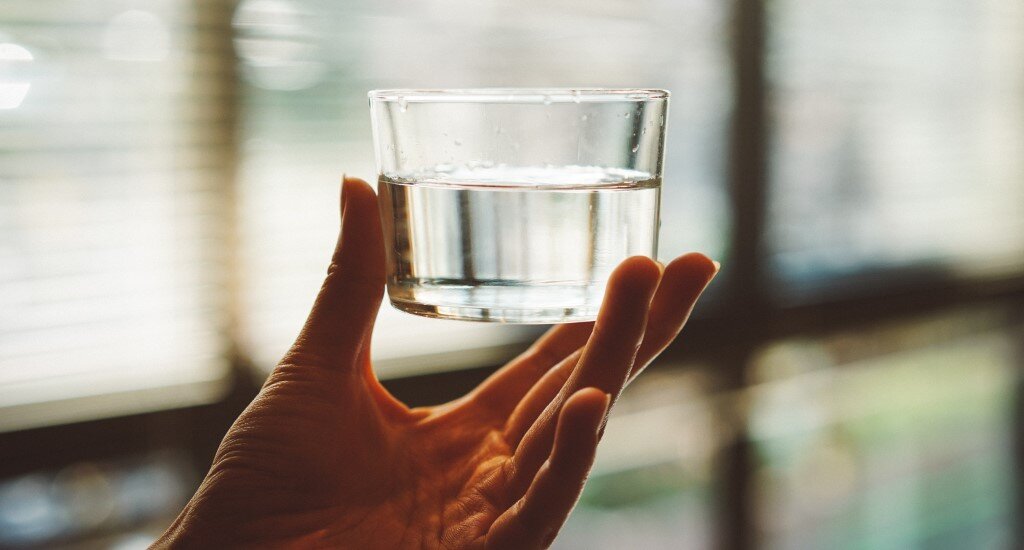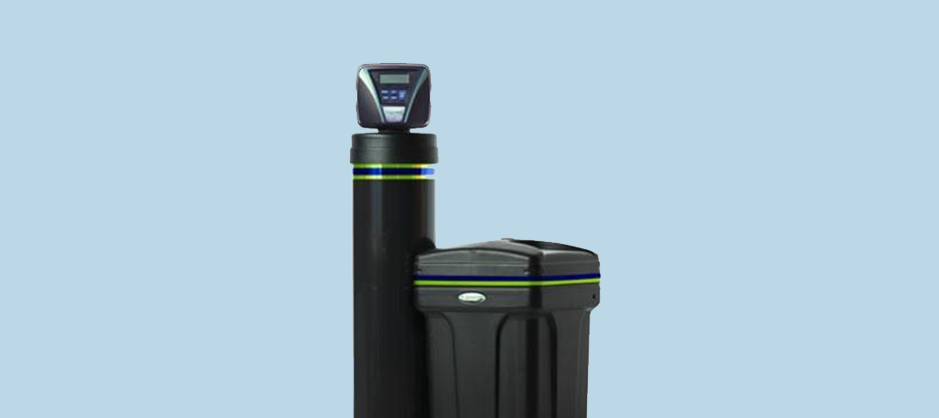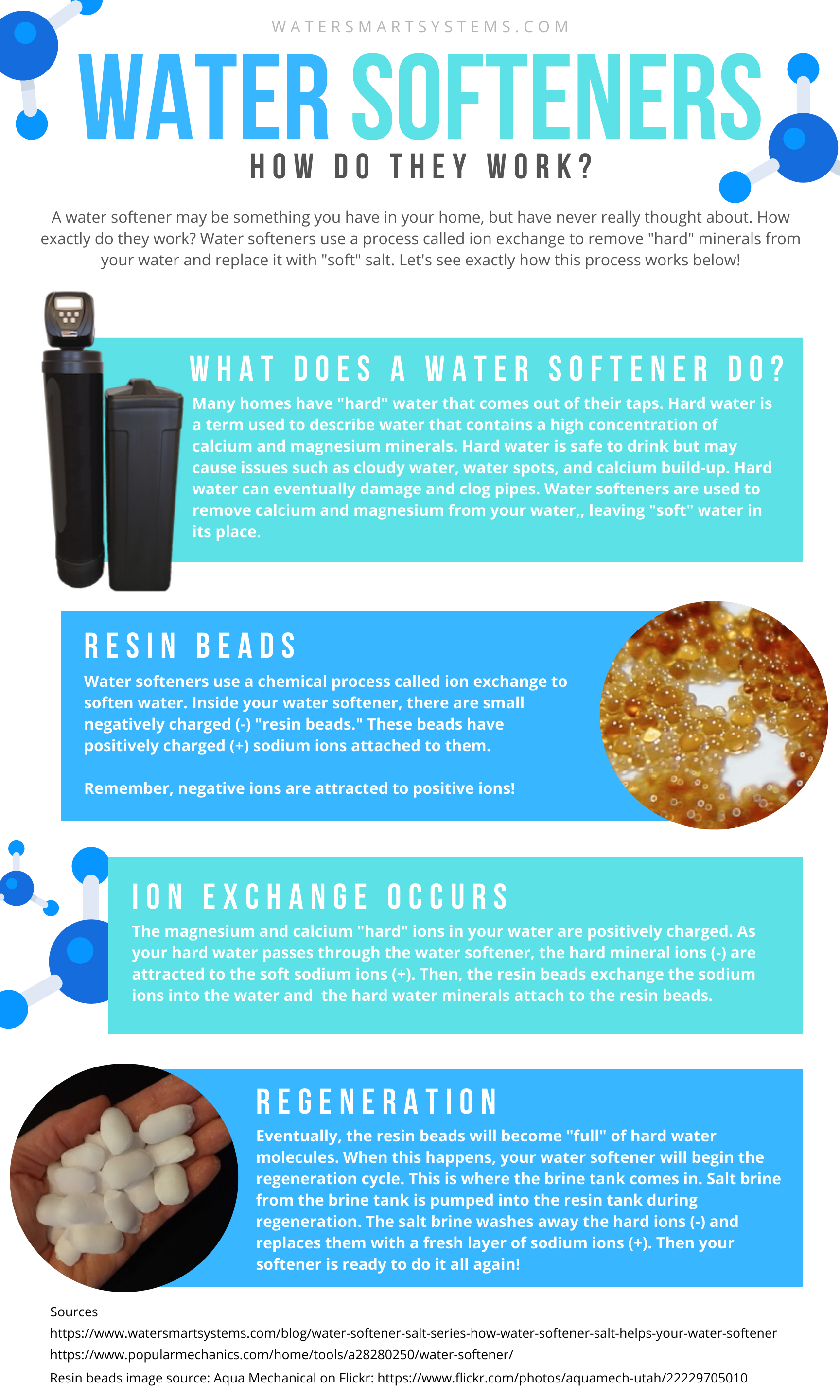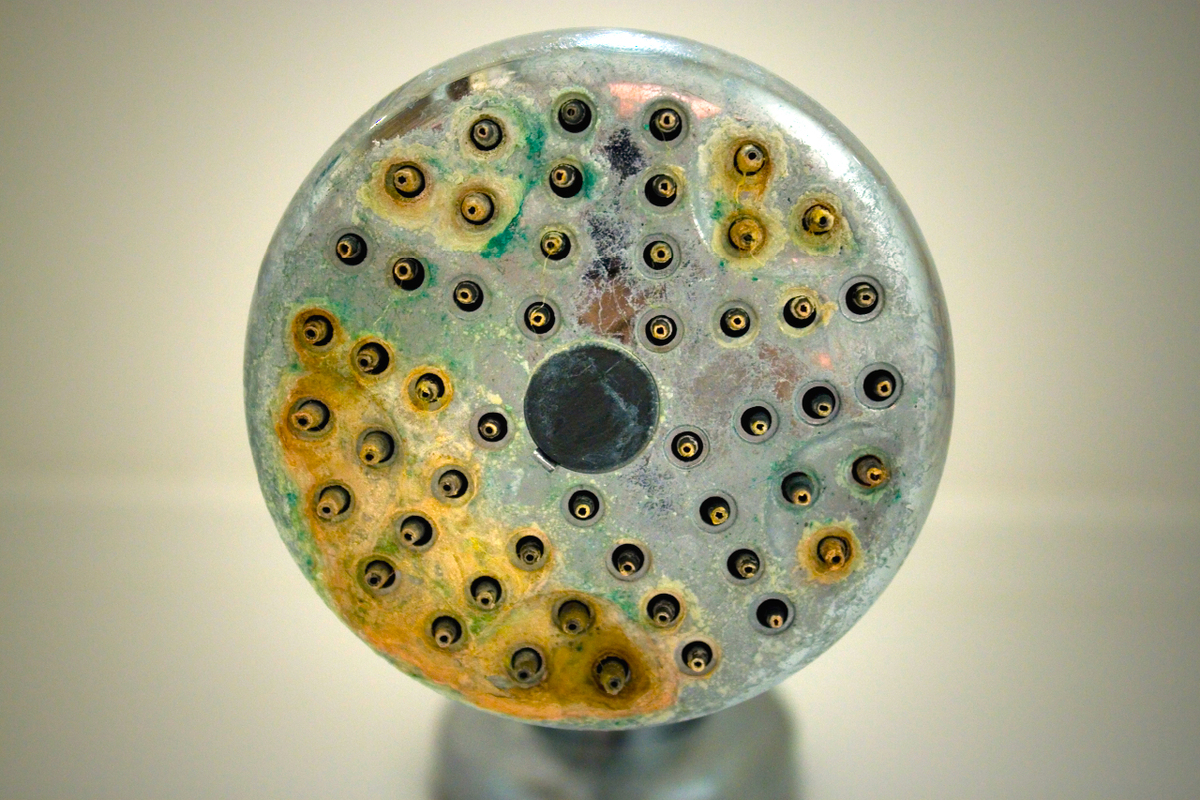Ontario water hardness ranges anywhere on average from 3.7 to 296 mg/L, with an average of 95 mg/L. To learn more about what that means for you, click on the following informative sections.
Need help solving your water hardness problem? Contact us.
Ontario Water Hardness
1. What Is Water Hardness?
Hard water has large deposits of calcium and magnesium
If your water contains large amounts of dissolved minerals such as calcium and magnesium, then it is considered “hard water.”
When water percolates or filters through porous materials in the ground, such as deposits of limestone, chalk, or gypsum, then it becomes hard. These materials are mostly made up of calcium and magnesium.
The following video explains further how water becomes hard.
Water hardness is measured in mg/L or gpg
Water hardness is measured in milligrams per litre (mg/L). This refers to how many milligrams of mineral deposits are found in each litre of water. Another very common way to refer to your water hardness is in grains per U.S. gallon (gpg).
If your water has a hardness range of more than 120 mg/L then it is considered hard. If your hardness range if over 180 mg/L, then it is considered very hard.
2. Ontario Water Hardness Levels in Major Cities
Waterloo has some of the hardest water in Ontario
The following is a breakdown of Ontario water hardness levels in major cities across the province.
Cambridge Water Hardness: 342-548 mg/L
Guelph Water Hardness: 360-550 mg/L
Hamilton Water Hardness: 51-500 mg/L
Kitchener Water Hardness: 291-616 mg/L
London Water Hardness: 89.5-113 mg/L
Ottawa Water Hardness: 30-350 mg/L
Toronto Water Hardness: 111-136 mg/L
Waterloo Water Hardness: 291-650 mg/L
Windsor Water Hardness: 90-125 mg/L
York Region Water Hardness: 112-320 mg/L
3. Why Is Ontario's Water Hard?
Groundwater is usually harder than surface water
Much of Ontario's water comes from groundwater sources. Groundwater is the water that is found under the earth's surface in spaces between rock and soil pore spaces.
Groundwater is usually less susceptible to pollution than surface water is, so it is often used for public water supplies, however, it is usually harder than surface water.
In addition, Ontario lakes and streams contain a very wide range of hardness levels, anywhere from 2 to 1803 mg/L. However, on average their hardness level falls between 40 and 200 mg/L.
4. How Ontario Water Hardness Compares to the Rest of Canada
Ontario water hardness is higher than the rest of Canada
About 50% of the municipal water supplies across Canada have water hardness levels below 80 mg/L and about 20% have hardness levels below 80 mg/L.
However, in Ontario and in the Prairie provinces, you can find water hardness levels that exceed 180 mg/L, which is much higher than the rest of Canada.
"In Ontario, the hardness of drinking water from surface sources ranged from 3.7 to 296 mg/L, with an average of 95 mg/L; the hardness of groundwater supplies was higher, and levels ranged from 40 to 1300 mg/L, with an average of 294 mg/L." - Health Canada
In a survey of 525 municipalities across Canada, only 17 cities had drinking water hardness levels above 500 mg/L. All of these cities were located in Ontario and Saskatchewan.
5. Ontario Water Hardness Problems
Having hard water makes it difficult to get your dishes clean
Even though there are no apparent health risks to drinking hard water, some people find the taste unpleasant.
In addition, having hard water can cause a number of issues in your home. Some of these problems include:
Damage to your dishwasher, washing machine, and hot water heater due to mineral build-up
Calcium build-up in your shower
Sink and toilet bowl stains
Damage to your plumbing pipes
Difficulties getting your dishes and laundry clean
Damage to your clothing, causing it to wear out faster
6. How to Make Your Water Softer
A water softener can make your water soft
Installing a water softener is the best way to make your water softer. Here is a simplified explanation of how a water softener works:
Hard water (containing positive calcium and magnesium ions) enters the resin tank of your water softener.
The negatively charged resin beads attract the positively charged calcium and magnesium ions like a magnet.
The positive ions attach to the resin beads as the negative sodium ions on the beads are released into the water making it soft.
After a while, the resin beads will fill up with hardness ions and won't be able to attract anymore. Your water softener will pump salt brine into the tank to regenerate the beads.
The following diagram further explains this process:
7. How to clean stains caused by Ontario Water Hardness
Cleaning stains caused by hard water can be challenging, but here are some effective methods you can try:
Vinegar: Vinegar is acidic and can effectively dissolve mineral deposits left by hard water. Mix equal parts of white vinegar and water in a spray bottle and spray the solution onto the stained surfaces. Let it sit for a few minutes, then scrub it with a brush or sponge. Rinse thoroughly with water.
Lemon Juice: Lemon juice contains citric acid, which can help break down hard water stains. Apply undiluted lemon juice onto the stains and let it sit for a few minutes before scrubbing and rinsing.
Baking Soda: Baking soda is mildly abrasive and can help remove surface stains caused by hard water. Make a paste by mixing baking soda with water and apply it to the stained areas. Scrub gently with a brush or sponge, then rinse.
Commercial Cleaners: There are many commercial cleaners available specifically formulated to remove hard water stains. Look for products containing ingredients like hydrochloric acid, oxalic acid, or phosphoric acid. Follow the manufacturer's instructions carefully when using these products.
Limescale Removers: For stubborn limescale deposits, you may need a stronger cleaner specifically designed to dissolve mineral buildup. These products are often available in gel or spray form and are applied directly to the stains. Again, be sure to follow the instructions provided.
Steam Cleaning: Steam cleaners can be effective at removing hard water stains from various surfaces, including glass, tiles, and fixtures. The high temperature of the steam helps to break down and dissolve mineral deposits.
Preventative Measures: To prevent future hard water stains, consider installing a water softener system in your home. Water softeners remove minerals from the water, reducing the likelihood of stains forming. You can also use a squeegee to wipe down shower walls and glass doors after each use to prevent water spots.
When using any cleaning products or methods, always test them in a small, inconspicuous area first to ensure they do not cause damage to the surface. Additionally, make sure to wear appropriate protective gear, such as gloves and eye protection, especially when working with acidic cleaners.
8. How to Learn More About Ontario Water Hardness
To learn more about specific water hardness chemical compositions around Ontario, you can follow these steps:
Contact Local Water Authorities: Reach out to the local water authorities in the area you're interested in. They often conduct regular testing of water quality and can provide you with data on water hardness and its chemical composition. This information may be available on their website or can be obtained by contacting them directly.
Provincial Water Quality Reports: Check provincial water quality reports. Ontario's Ministry of the Environment, Conservation and Parks (MECP) regularly publishes reports on water quality across the province. These reports may include data on water hardness and chemical composition.
University Research: Look into research conducted by universities in Ontario. Universities often conduct studies on water quality and publish their findings. You can search for relevant research papers or contact professors or researchers in the field for information.
Online Databases and Resources: Explore online databases and resources related to water quality. Websites like the Ontario Ministry of the Environment, Conservation and Parks or the Ontario Geological Survey may have data and resources available for public access.
Water Testing Kits: Consider using water testing kits to test the water hardness and chemical composition yourself. These kits are available commercially and can provide you with immediate results. However, for more accurate and comprehensive analysis, professional water testing laboratories may be required.
Local Libraries and Government Offices: Visit local libraries or government offices where you may find reports, studies, or publications related to water quality in Ontario. Librarians or government officials may also be able to guide you to relevant resources.
Consult Experts: Reach out to water quality experts or environmental consultants who specialize in water quality analysis. They can provide you with valuable insights and guidance on accessing relevant data and interpreting the results.
By utilizing these resources and approaches, you can learn more about specific water hardness chemical compositions around Ontario and gain a better understanding of the water quality in the area of interest.
Learn more about Ontario water hardness by following the tips above.
Want Softer Water? Contact WaterSmart
If you would like to install a water softener in the KW Region, WaterSmart can help. Our experienced staff can advise you on the best system for your needs and we will install and program it to solve your water hardness problems.
If you need water softener repair in the KW Region, you can trust WaterSmart. We'd be happy to help you with any repair or service on any type of water softener you have, at a reasonable rate.
Our expert, experienced plumbers will come to your home, take a look at your system, and advise you about the best course of action.
Whenever possible, we will fix your existing unit, and if you need a replacement, we can advise you on what type of softener would best meet your needs. We even offer financing. Contact WaterSmart today and start enjoying soft water.
"What a great experience!! I did a search on the internet, called regarding the price of a water softener and the next day it was installed and we had soft water again. Paul removed the old softener, installed and setup the new one and was out in just over an hour. He also noted that the grounding of water pipe was not done by previous installer and he corrected that as well. Cost was the same as softener that was installed 14 years ago - I am impressed." - Larry Roes
Read more reviews










